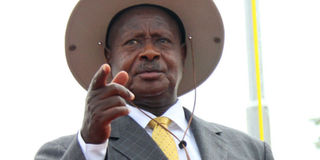I wasn’t aware of bimeeza closure - Museveni

President Museveni has said that the current term of office (2016-2021) is for working and not sleeping. FILE PHOTO
What you need to know:
The shows are said to have created a mass of knowledgeable and politically alert citizens.
Kampala- Managers of radio stations have expressed skepticism over the President’s remarks that he did not mind the re-opening of open-air talk-shows commonly known as bimeeza.
President Museveni said at the weekend that he was not aware of the closure of the programmes that had been used as a vehicle for citizens to discuss current affairs about their nation.
Capt Francis Babu, the chairman Uganda Broadcasters’ Association (UBA), said before they were banned in 2009, bimeeza were platforms for citizens to debate issues that affected them. Capt Babu said rather than ban them, guidelines should have been set to guard against blackmail orchestrated by some hired participants.
“We welcome the President’s comments,” Mr Babu said. “The problem was, some people had turned into a business to use them to defame others. Some people were hiring others to abuse others.”
Mr Babu, however, claimed that all talks shows, even those that are hosted within the studios, are bimeeza since they are call-in programmes. “The term Kimeeza means a round table from where people discuss issues.”
The bimeeza, usually hosted at the weekend, were banned in 2009 by the then Information minister, Kabakumba Matsiko. This was at the height of the disagreements between Mengo and the central government over the visit of the Kabaka to Bugerere (Kayunga) to preside over Buganda youth day celebrations.
Spontaneous riots broke out and several radio stations, including the kingdom owned CBS FM, were closed accusing them of inciting violence.
The minister later announced the banning of open air talk shows aka bimeeza.
Mr Jeff Kiwanuka, the administrator Radio One, observed that the shows improved the quality of debate among citizens and Members of Parliament. He said up to now, the reason for their closure is not clear.
Mr Dick Nvule, the assistant Manager Radio Simba, said he felt the shows were banned because they were creating a mass of knowledgeable and politically alert citizens.
“We have several government officials and opposition MPs who were groomed by these shows. Several people are what they are today because of these shows,” Mr Nvule said.



